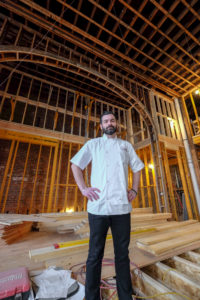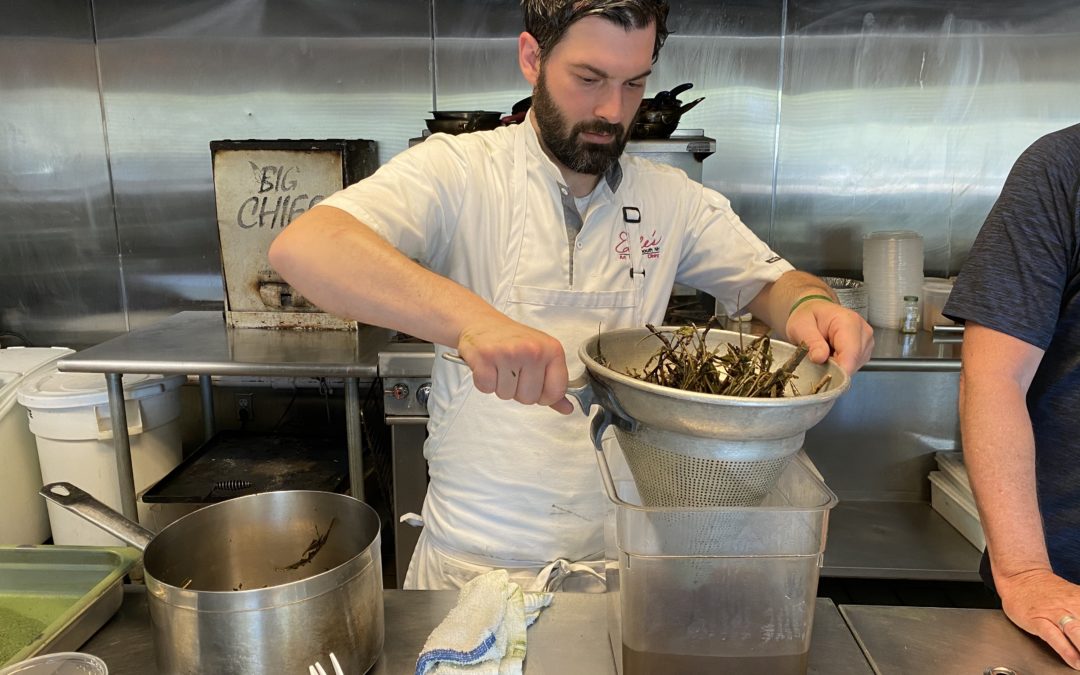My main focus as Executive Chef of The Labrie Group is trying to develop relationships with local farms. It’s interesting, because I assumed moving to the Seacoast, in the economic hub of New Hampshire, that it would be far easier than it was up North for me during my time at Mountain View Grand Resort. It’s turning out to be kind of the opposite. There seems to be a shortage of voices for the local farming community, and because of that, we as the chef team of The Labrie Group are going to try to fill that void through our food and menus, and developing these relationships.
I see a lot of local food on menus, sure; the difference for us is we’re going to do it at scale, not just as a special dish on the menu. Planning for this can be more difficult to arrange, but in the long run it’s better for us and our guests, while also providing the farmers with a consistent stream of income. So now it’s about cold calling local farms, and working to develop relationships so we make sure that wherever we are getting our meat or produce from, they care about the ingredients as much as we do when we are cooking. The best way to do that is to go straight to the farmer.
We also want to try to open up the understanding of real seasonality with vegetables. For example, this time of year we focus on trying to source more plants from the Brassica family (cabbage, broccoli, cauliflower, etc.) Why? Because they are relatively hardy for this time of year, and a cold night actually increases the amount of sugar. Right now is their peak season and the perfect time to incorporate it into a menu.
 I also think there’s a big disconnect for people between chefs and farmers. People think a chef’s gig is cool, but the most important player in this whole ecosystem is the farmer. So they’re the ones we want to showcase. I want the farmer to be the one who is talked about at our table when a guest is trying to decide which entree they want to order. I’m just applying heat. I’m not nursing the plants for months from seed to fruit. My relationship to that plant is different, but I want my team to be aware that someone has taken great care in raising this piece of produce or meat, and we need to respect that. And I want the guests to start making those connections and learn about the people doing these amazing things all around the state.
I also think there’s a big disconnect for people between chefs and farmers. People think a chef’s gig is cool, but the most important player in this whole ecosystem is the farmer. So they’re the ones we want to showcase. I want the farmer to be the one who is talked about at our table when a guest is trying to decide which entree they want to order. I’m just applying heat. I’m not nursing the plants for months from seed to fruit. My relationship to that plant is different, but I want my team to be aware that someone has taken great care in raising this piece of produce or meat, and we need to respect that. And I want the guests to start making those connections and learn about the people doing these amazing things all around the state.
Farming in New Hampshire is obviously much more difficult than somewhere closer to the equator where the growing season is all year round. Here, because we have such exacting seasons, when you harvest, it’s so special because you can’t simply replant and do another run with snow coming. We want to showcase what’s coming out of the ground, not just where, but when. We want to provide a sense of time on the menu, with ingredients starting to change with different flavors showing up with changing seasons.
A vegetable farmer is really a soil farmer. A good farmer really focuses on the soil. And no, it’s not dirt, that’s an insult. Soil is something that’s been mended and rotated and paid attention to. And the farmer isn’t growing it for weight or the biggest yield possible because they would be deleting all of their plants of nutrients. Nutritional value directly coincides with flavor. It’s that knowledge through research and outreach to the local community that we’re trying to build. We’re just applying heat. Maybe a little salt. If you’re getting the best product, it’s easy to be the best chef. And that’s what we’re trying to understand.
– Nate


